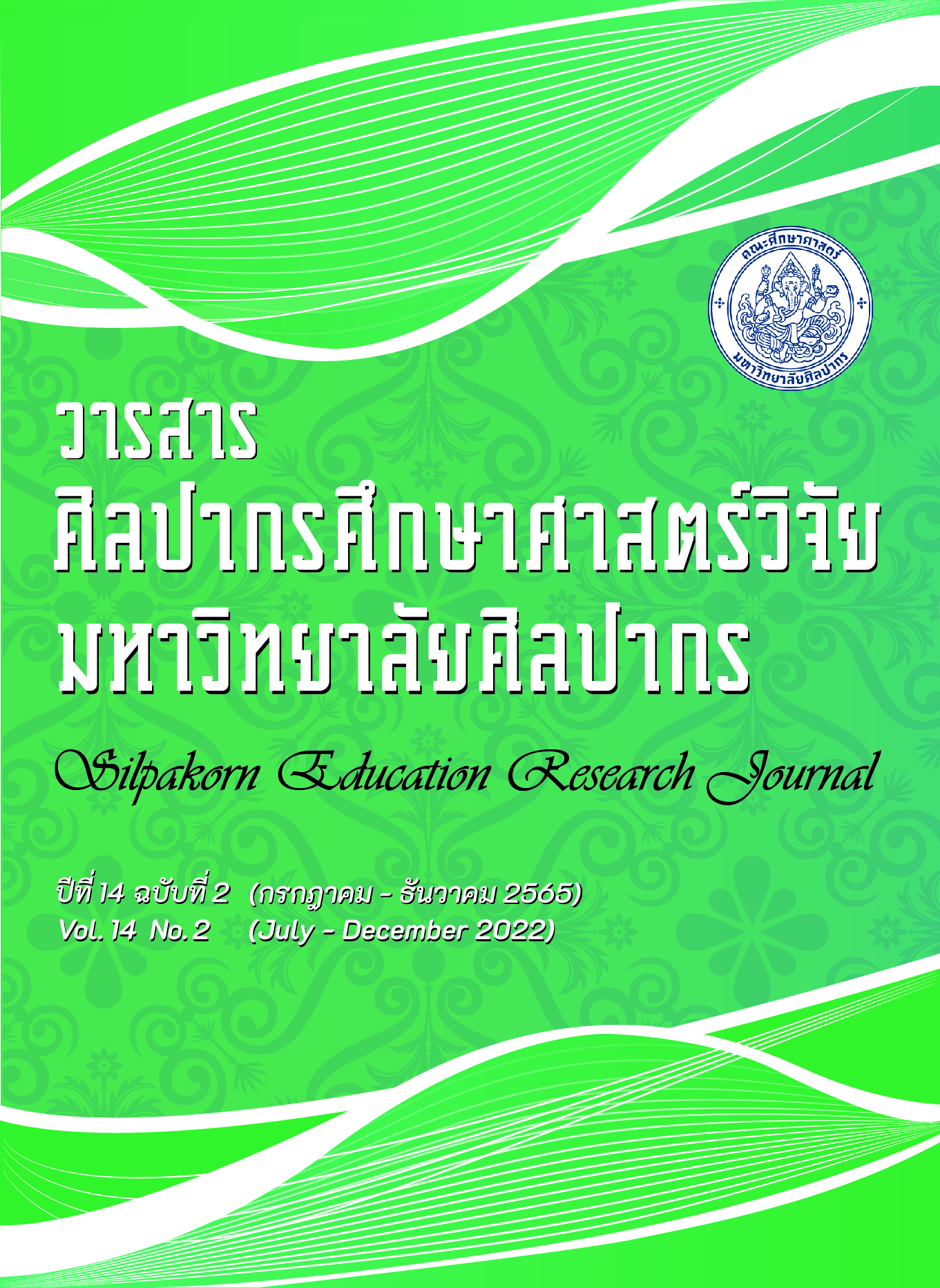การพัฒนาทักษะกระบวนการทางวิทยาศาสตร์ และความสามารถในการคิดวิเคราะห์ ของนักเรียนชั้นประถมศึกษาปีที่ 4 โดยการจัดการเรียนรู้ แบบวัฎจักรการเรียนรู้ 7 ขั้น (7E) ร่วมกับคำถามปลายเปิด
คำสำคัญ:
ทักษะกระบวนการทางวิทยาศาสตร์ ความสามารถในการคิดวิเคราะห์ การจัดการเรียนรู้แบบวัฏจักรการเรียนรู้7 ขั้น (7E) คำถามปลายเปิดบทคัดย่อ
การวิจัยครั้งนี้มีจุดประสงค์เพื่อพัฒนา 1) ทักษะกระบวนการทางวิทยาศาสตร์ และ 2) ความสามารถ
ในการคิดวิเคราะห์ของนักเรียนชั้นประถมศึกษาปีที่ 4 โดยใช้รูปแบบการเรียนรู้แบบวัฏจักรการเรียนรู้ 7 ขั้น (7E)
ร่วมกับคำถามปลายเปิดให้นักเรียนมีคะแนนเฉลี่ยและมีจำนวนนักเรียนผ่านเกณฑ์ร้อยละ 70 ขึ้นไป กลุ่มเป้าหมาย คือนักเรียนชั้นประถมศึกษาปีที่ 4/1 สำนักงานเขตพื้นที่ประถมศึกษา ขอนแก่น เขต 5 จำนวน 50 คน โดยวิธีการเลือกแบบเจาะจง ใช้รูปแบบวิจัยเชิงปฏิบัติการจำนวน 3 วงจร เครื่องมือที่ใช้ในการวิจัย ได้แก่ 1) เครื่องมือปฏิบัติการ 2) เครื่องมือที่ใช้ในการสะท้อนผลการวิจัย และ 3) เครื่องมือประเมินผล วิเคราะห์ข้อมูลเชิงปริมาณโดยการหาค่าเฉลี่ย ส่วนเบี่ยงเบนมาตรฐานและร้อยละ และวิเคราะห์ข้อมูลเชิงคุณภาพโดยการวิเคราะห์เชิงเนื้อหา ผลการวิจัยพบว่า 1) นักเรียนมีคะแนนทักษะกระบวนการทางวิทยาศาสตร์เฉลี่ย 22.58 คิดเป็นร้อยละ 75.27 นักเรียนผ่านเกณฑ์จำนวน 36 คน คิดเป็นร้อยละ 72.00 ซึ่งสูงกว่าเกณฑ์ที่กำหนดไว้ โดยนักเรียนเกิดการพัฒนาทักษะกระบวนการทางวิทยาศาสตร์ ทั้ง 5 ด้าน ได้แก่ ทักษะการจำแนกประเภท ทักษะการจัดกระทำและสื่อความหมายข้อมูล ทักษะการสังเกต ทักษะการตีความหมายข้อมูลและลงข้อสรุป และทักษะการลงความคิดเห็นจากข้อมูลตามลำดับ 2) นักเรียนมีคะแนนความสามารถในการคิดวิเคราะห์เฉลี่ยเท่ากับ 23.72 คิดเป็นร้อยละ 79.07 นักเรียนผ่านเกณฑ์จำนวน 38 คน คิดเป็นร้อยละ 76.00 ซึ่งสูงกว่าเกณฑ์ที่กำหนดไว้ โดยนักเรียนเกิดการพัฒนาความสามารถในการคิดวิเคราะห์ ด้านวิเคราะห์ความสำคัญ ด้านวิเคราะห์ความสัมพันธ์และด้านวิเคราะห์หลักการตามลำดับ
เอกสารอ้างอิง
Bloom, B. S. (1961). Taxonomy of Educational Objectives. New York: David Mckey Company. ChinFan, C. (2011). Analytical, Synthetical Thinking and Works of Grade 9 Students on the Topic of “Water Resource Conservation” Who were Taught Using Learning Cycle Model (7Es) Together with Open-ended Question. Master of Education Thisis Program in Science Education in Science Education Graduate School Khon Kaen University. (in Thai)
Choksumritpon, T. (2020). “The Development of Learning Package by Using the Inquiry Cycle Method (7e) with Stem Education to Improve Scientific Skills, and also Reading and Writing Skills of Scientific Language for Prathomseuksa 3 students”. UMT Poly Journal 17(2): 602-619. (in Thai)
Chumchonnongruea School. (2020). Chumchonnongruea School information. Khon Kaen: Chumchonnongruea School. (in Thai)
Chungkrud, P. (2015). “Effect of 7E Learning Cycle with Six Hats Technique Affecting Analytical Thinking and Integrated Science Process Skills on the Topic of Momentum and Collisions of Matthayomsuksa IV Students”. Journal of Education Naresuan 17(2): 123-134. (in Thai)
Department of Curriculum and Instruction Development. (2003). Organization of Learning Subjects of Science Learning Subject Groups According to Basic Education Curricula, B.E. 2544. Bangkok: Printing guru of LAT Phrao. (in Thai)
Eisenkraft. (2003). “Expanding the 5E Model: A Proposed 7E Model Emphasizes Transferring Learning and the Importance of Eliciting Prior Understanding”. The Science Teacher 70(6): 56-59.
Inprasitha, M. (2006). Mathematics Learning Process of High School Students with Open -Ended Problem Tactics. Khon Kaen: Faculty of Education Khon Kaen University.
IPST. (2003). Basic Education Curriculum B.E. 2544. Bangkok: Express Transportation Organization of Thailand. (in Thai)
Keawam, R. (2016). “Using Open-Ended Question in Teaching Mathematics”. Srinakharinwirot Research and Development Journal of Humanities and Social Sciences 8(15):
-211. (in Thai)
Kormanee, T. (2013). Comparison of Results Physics Learning Effect on Light and Visual Devices and Scientific Process Skills of Students in Mathayom 5 Between the 7-step Learning Cycle and Problem - Based Learning. Master of Education Thisis Program in Science Education in Science Education Graduate School Mahasarakram University. (in Thai)
Kemmis, S., and McTaggart, R. (1988). The Action Research Planner. Geelong, Australia: Deakin University Press.
KrongKaew, C. (2018). “A Study on Critical Thinking Ability of the Prathomsuksa 3 Students in Learning Science through 7E Learning Cycle Incorporated LT Technique”. Mubanchombueng Rajabhat University Research Journal (Humanities and Social Science) 6(2): 94-103. (in Thai)
Ministry of Education. (2008). Basic Education Core Curriculum B.E. 2551. Bangkok: Printing Guru of Latphrao. (in Thai)
Na Ayutthaya, D. (1992). Intelligent Child. Bangkok: Printing Guru of Reed. (in Thai)
Namtong, K. (2015). “A Study of Learning Achievement on Force and Newton’s Law of Motion Learning Unit, Scientific Process Skills and Scientific Mind of 10th Grade Students : Using Inquiry Cycle Learning Management (7E)”. Ratchaphruek Journal 13(2): 86-92. (in Thai)
Niets. (2020). Summary of the Results of the Primary National Educational Test (O-NET), Grade 6, academic year 2020. [Online]. Retrieved April 22, 2021, from https://www.niets or.th.
Office of Nation Education Standards and Quality Assessment. (2005). Record 2006. Bangkok: Office of Nation Education Standards and Quality Assessment. (in Thai)
Rodrangkha, W. (1999). Student thinking Development with Scientific Process Skills Activities. Bangkok: Academic Quality Development Institute. (in Thai)
Sresurach, S. (2019). “The Development of Analytical Thinking Ability and Learning Achievement on Science using 7E Learning Cycle Model for Grade 5 Primary School Students at Muangamnatcharoen School”. SSRU Academy jounal of Education 3(2): 20-30. (in Thai)
Punak, J. (2018). “ Development of Mathematical Creativity, Achievement and Attitude Application on “Fundamental of Data Analysis”of Mathayomsuksa 6 Students at Rachineeburana School, NakhonPathom Province Learning by Open-Ended Questions”. Veridian E-Journal,Silpakorn University 11(3): 401-419. (in Thai)
Poovayanphong, P. and Klaimongkol, Y. (2015) “Effect of Process of Conductinginquiry Learninga Learningactivities Using 7learning Cycle Integratedwith ICT on Science Process Skills” An Online Journal of Education 10(2): 172 - 184
Wilaison, K. (2016). “Effects of the 7E Learning Cycle Model with A Concept Mapping of the Food and Living Unit on Learning Achievement and Analytical Thinking Abilities of Mathayomsuksa Two Students”. Veridian E-Journal,Silpakorn University 9(2): 407-423. (in Thai)
Yimchay, W. (2017). “The Study of Learning Achievement in Biology and Analytical Thinking Skills by Using The 7E – Learning Activities for 10th Grade Students”. Journal of Education Naresuan University 19(2): 95-107. (in Thai)





